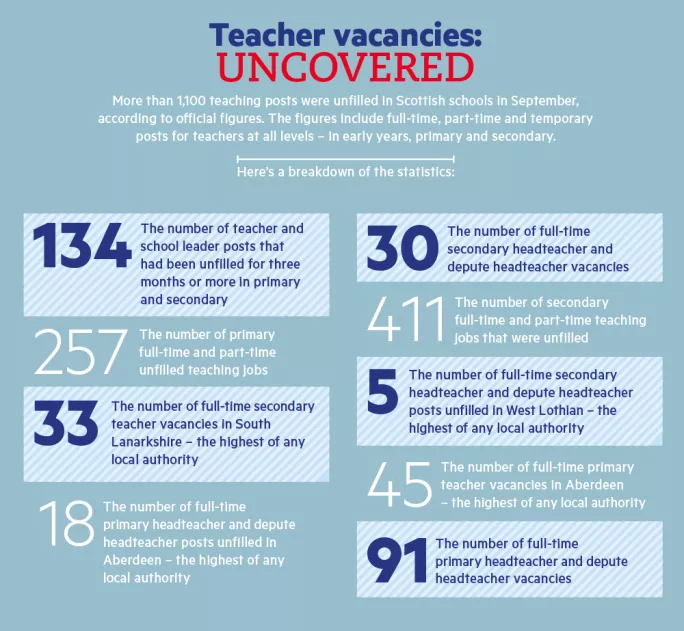Councils demand powers to tackle teacher shortage

A group of local authorities is demanding to take over control of teacher training to tackle “cruel” staff shortages believed to be damaging pupils’ education in rural areas.
The demand from the seven councils that make up the Northern Alliance comes as authorities are turning to increasingly desperate measures to plug teaching gaps, including asking parents to help them to find qualified staff.
The councils - Aberdeen, Aberdeenshire, Highland, Moray, Orkney, Shetland and the Western Isles - want to introduce more varied routes into the profession, and for trainees to carry out more practical experience in schools so they become more rooted in the area.
They also want workforce planning to look further ahead and take greater account of local circumstances.
The changes would give them control over areas currently overseen by the government. However, they say that they are not calling for initial teacher education to be taken out of the hands of the universities.
The councils also claim that the government’s Attainment Challenge is exacerbating teacher recruitment problems in remote and rural areas, by increasing job opportunities for teachers in urban areas at a time of shortage.
Maria Walker, director of education and children’s services in Aberdeenshire, said: “Because there is more money in the system, more teachers can be employed, and peripheral areas suffer.”

‘Regional responsibility’
Education secretary John Swinney visited the region on Tuesday, when he announced that more than £3 million was being made available to train an extra 371 teachers next year across Scotland.
Mr Swinney said that places on teacher education courses would increase to 3,861 - a rise for the sixth consecutive year.
The Northern Alliance welcomed the investment, announced at the Aberdeen Learning Festival, but maintained that teacher education should become “a regional responsibility”.In a submission to the Scottish government’s governance review, the Northern Alliance said: “In the North and North East, it is clear that [a] teacher shortage is holding back educational development, and the pipeline in teacher education is not flexible enough.
“We welcome the recent national announcements regarding further expansion and flexibility with regard to teacher training, but we ask for this to go further, to enable local authorities to train and grow their own teachers, especially in the areas of greatest need.”
In a bit to ease shortages, the Scottish government has also invested £1 million in creating new routes into teaching, including fast-tracking new teachers into the profession and recruiting teachers from Ireland, and has launched a £350,000 teacher recruitment campaign targeting science undergraduates.
However, the best way to recruit teachers to more remote and rural parts of Scotland is to “grow your own” and train up local people who want to join the profession, said Ms Walker.
Aberdeenshire launched the DLITE (Distance Learning Initial Teacher Education) scheme, which trains degree-qualified council workers to become primary teachers. It produces around 40 teachers each year and is set to expand into secondary schools.
However, the councils involved could easily accommodate more teacher training, and those in the Northern Alliance would like to explore other routes into the profession, Ms Walker said.
‘The current situation is really cruel. For us, teacher recruitment is our constant worry’
“The current situation is really cruel. For us, teacher recruitment is our constant worry,” she added.
“If you believe that good teachers make the difference, how do you make that difference if you don’t have the teachers?”
Meanwhile, the director of education and social care in Moray, Laurence Findlay, told TESS that he had issued a written plea to parents last month asking them to encourage anyone they knew with a teaching qualification or the desire to become a teacher to make contact with the council.
He also warned the parents that some secondary subjects - such as science, technical education and home economics - might have to be taught centrally in “twilight sessions” because the council had been “unable to attract sufficient numbers of teachers to cover vacancies”.
Mr Findlay wrote in his letter: “The situation in Moray is not as bad as in some areas, but it is certainly not improving and there are real risks to service continuity and for certain specialist subjects in secondary.”
Aberdeenshire Council has also written to parents in some areas asking for their help in recruiting staff. Last month it ran a “new year, new career” campaign in an effort to attract people with a teaching qualification who had left the profession back into the fold.
Other recruitment campaigns have been launched across the country, with varying degrees of success (see “Desperate measures to cope with the crisis” box, below).
The most recent workforce planning exercise found that, in September, 1,100 teaching posts were lying unfilled in Scottish schools.
A Scottish government spokeswoman said: “Local authorities are already heavily involved in the workforce planning process and we have worked with them to strengthen their input, for example to factor in local information such as vacancies.
“We are carefully considering all responses to the governance review as we move to put schools and communities at the heart of the education system.”
You need a Tes subscription to read this article
Subscribe now to read this article and get other subscriber-only content:
- Unlimited access to all Tes magazine content
- Exclusive subscriber-only stories
- Award-winning email newsletters
Already a subscriber? Log in
You need a subscription to read this article
Subscribe now to read this article and get other subscriber-only content, including:
- Unlimited access to all Tes magazine content
- Exclusive subscriber-only stories
- Award-winning email newsletters
topics in this article



